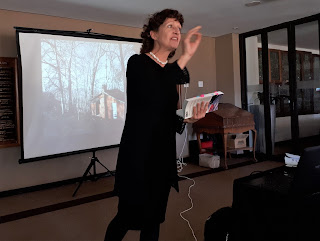Last Week
It was a Business Meeting and as President Lyn was away PP Jean Bernardo ran the meeting. It was a good start to the Rotary Year with a number of interesting projects in the pipe line.
We had two visitors, Christine Kasebe-Sata from the Rotary Club of Lusaka Central. Here Jean Bernardo is swopping banners. .....it's nice to see that she had the same lack of height problem that I had as President when it comes to presenting something!
This Week

Our guest speaker is John Berks of Radio 702 fame. Robin Binckes has just written a biography of him called "What a Boykie!" I am not sure whether Robin will be with us.
A story of determination and guts of a boy 'born with a wooden spoon' in his mouth, who managed through perseverance and sheer will power to turn that into one of silver. Born the third child of hardworking, honest Jewish parents in Krugersdorp in 1941, a nervy, hypochondriac who broke into a nervous rash whenever he felt uncomfortable or stressed, the boy was a total disaster, academically promoted to higher classes only because of his age. From an early age John would listen to the radio at any opportunity that presented itself, spending hours perfecting the mimicking of great commentators, holding a tablespoon up to his mouth as he spoke, setting his mind on a career in radio. Through a series of coincidences his lucky break finally came and he was employed by the fledgling commercial station LM Radio in Lourenco Marques (Maputo). From a stammering, stuttering insecure young announcer, he quickly blossomed and began to make his mark on the station. Sent to Australia by the legendary David Davies to study commercial radio John brought back the secret and pattern of success of commercial radio in Australia, which became the blueprint for broadcasting in South Africa. His radio career spanned 40 years, included working on LM Radio, SABC, Springbok Radio, Radio 5, Capitol Radio, Swazi Music Radio and 702 is legendary. Pioneering modern radio in South Africa, he broke new ground in radio broadcasting through his hilarious parodies of situations, phone calls to unsuspecting victims, his 'characters' such as 'Jan Sweetpak' and others, his humour and development of talk shows and techniques used by many today. He developed 'Theatre of the mind' and took it to new heights, with a vision to push for talk radio at a time others said it would fail and changed the face of broadcasting in South Africa.
Rotary peace fellow applies lessons to life in Bogotá
As a child in Bogotá, Colombia, Lucas Peña was shocked to learn that violence between government forces and insurgent groups prevented his family from visiting relatives elsewhere in the country.
Years later in college, he studied the conflict from what he calls an “academic, analytical point of view.”
Only after graduating and joining the effort to demobilize ex-combatants did he really begin to understand the issues behind the violence that has plagued the nation for decades. (In February, members of the country’s largest insurgent group began surrendering their weapons as part of a peace deal with the government.)
Thanks to the Rotary Peace Fellowship, Peña earned his master’s degree in conflict, security, and development at the University of Bradford in Bradford, England, in 2015.
He now works for the World Wildlife Fund as a specialist in land governance. A member of the Bogotá Capital Rotary Club, Peña encourages other Colombians to become peace fellows. And it’s working: Five peace fellows were selected from Colombia for 2017.
Q: After college, you began working with the Organization of American States Mission to Support the Peace Process in Colombia, helping monitor the demobilization process of right-wing groups. What did that process entail, and what was your role in it?
A: At that time, the paramilitaries were laying down their guns, demobilizing their combatants, and participating in judicial processes. This was in exchange for spending only five to eight years in jail. As part of the demobilization process, the government had to issue identification to the ex-combatants, because without identification, they couldn’t re-integrate into society. The government provided them with health insurance and education, too.
What I did was report on their security conditions and the re-integration process of the ex-combatants. I did that by talking to people – local government officials, military, police officers, victims.
Q: How does your current work at the World Wildlife Fund pertain to peace?
A: We are working toward a policy for the provision of land to peasants who live in natural parks in Colombia. The peasants’ lack of land is what made them go to the national parks and live there illegally. There’s plenty of land in Colombia, but the good stuff is already owned; less than 1 percent of the population owns more than half of Colombia’s best land.
We expect the public-policy response will include the provision of land, but it also has to ensure that the peasants will be given productive land, as well as the means of making that land productive. Solving this problem is part of the peace accord that the Colombian government has reached with FARC [the Revolutionary Armed Forces of Colombia], the biggest guerrilla group.
Q: What did you learn from your time as a Rotary Peace Fellow?
A: Peacebuilding is not only a matter of local communities, not only a matter of national government, and not only a matter of the international community; it’s a mix of all those levels. Another thing I learned is that the world itself is getting safer, in that the number of people killed in conflicts has decreased proportionate to the population. It’s a very long and slow process, but the world is becoming more secure.





























